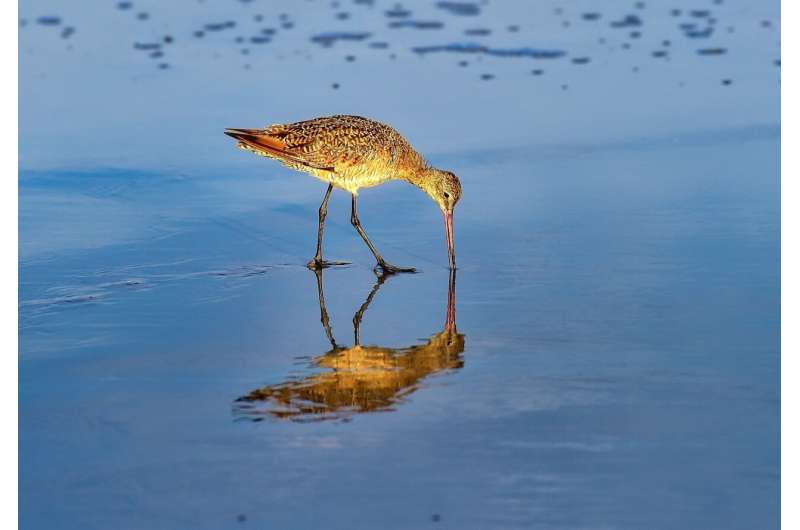This article has been reviewed according to Science X's editorial process and policies. Editors have highlighted the following attributes while ensuring the content's credibility:
fact-checked
reputable news agency
proofread
Rare marbled godwit dies soon after drawing admirers in Vermont: What happened?

Excited nature lovers flocked to a tiny town from all across the state of Vermont last September, wildlife officials said. They all came to see one rare sight: a marbled godwit.
The spotting on Sept. 19 in North Hero was a significant moment for birders in the area. It was the second time a marbled godwit was reported in Vermont during the past decade, according to eBird, a bird sighting database ran by the Cornell Lab of Ornithology.
"The godwit in North Hero was a rare and exciting find, the kind of 'vagrant'—or bird outside of its usual range—that gives local birders a chance to see a new species close to home," Vermont Fish and Wildlife Department bird biologist Jill Kilborn said in a Feb. 6 news release.
But seemingly out of nowhere, the godwit was found dead a week after its first sighting, officials said.
A landowner found the dead bird within a mile of where it was spotted alive, Kilborn told McClatchy News in an email.
Many birders grew worried about what happened to the godwit after they noticed its disappearance from the shore, officials said. Due to the rarity of the bird and its mysterious death, wildlife officials said they decided to send the bird to a laboratory in New Hampshire to find out what happened.
Now, months later, state officials have released the cause of the rare bird's death.
A marbled godwit is a shorebird with "stilt-like legs," officials said. It has an "extremely long" bill that helps it dig in the sand for food, according to All About Birds.
It's about as big as a crow with typically brown and white coloration, according to the database. The bird prefers to stay near wetlands during breeding, then move on to salt ponds and beaches during the winter.
Marbled godwits range from the Great Plains and Ontario when breeding to the Atlantic and Gulf Coast for winter, although they don't usually cross through Vermont, officials said.
It's unknown how the bird ended up in Vermont, although factors such as strong weather or migratory patterns can contribute, Kilborn said.
Confusion on what happened to the marbled godwit was cleared up with the test results from the University of New Hampshire Diagnostics Lab, according to state officials. The results took about six weeks to process, Kilborn said.
After a "full disease panel and necropsy," it appeared the bird died of natural causes, the department said.
Despite having no injuries, the godwit had several other issues that officials say may have contributed to its death: malnutrition, "high parasite load" and infections.
"Oftentimes birds found outside of their normal range are very stressed, and if they can't find the proper food or cover this can combine with other stressors like poor nutrition and sickness," Kilborn said in the release. "All evidence suggests this is what happened to the godwit."
Even though other factors were at play in the godwit's death, it still could serve as a valuable lesson on how "excited viewers" could put unintentional stress on a rare bird, Kilborn said.
"If a bird is changing their behavior because you are watching them, then you are too close," she said.
North Hero is about 35 miles northwest of Burlington.
2024 The Charlotte Observer. Distributed by Tribune Content Agency, LLC.


















